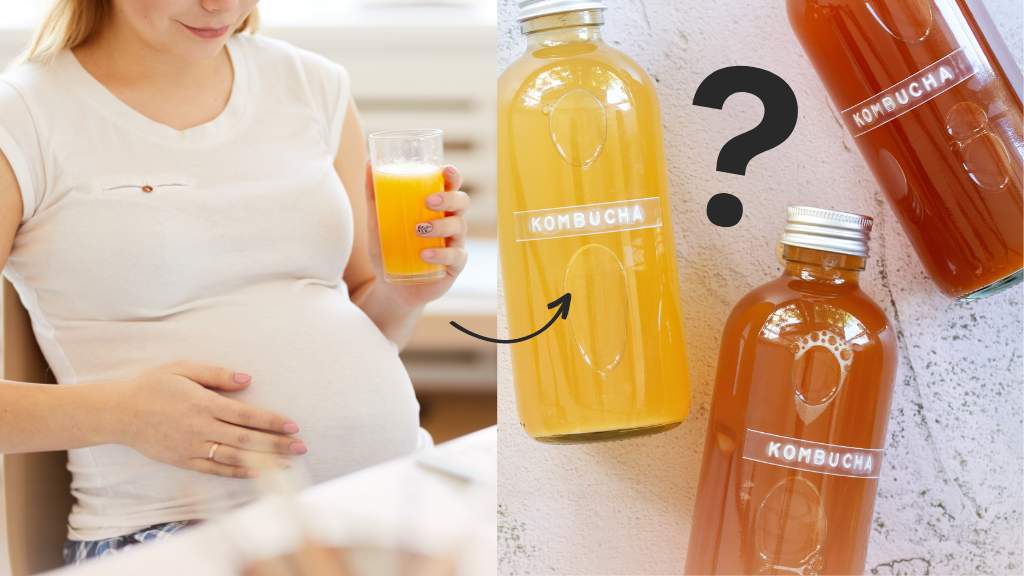
Even though kombucha is a fermented tea that was first made in China thousands of years ago, it has recently shot into popularity due to its potential health benefits. In addition to providing healthy probiotics, kombucha tea provides the same health benefits as drinking black or green tea. However, there is a lot of debate about whether you can drink kombucha while pregnant or breastfeeding.
We are here to answer this question and leave you some tips on what you can drink instead of Kombucha while pregnant. Meanwhile, take a look at what teas during pregnancy are safe to consume!
But First, What Is Kombucha?
Before we get into the science of whether pregnant women can drink kombucha, let’s understand what this popular brew is. Kombucha is a fermented beverage that is frequently made with green or black tea. There are many different ways to make kombucha. However, it typically entails a process of double fermentation.
- A SCOBY, a round, flat culture of bacteria and yeast, is typically fermented for a few weeks at room temperature in sweetened tea.
- After that, the kombucha is put to ferment in bottles.
- It carbonates for another one to two weeks. As a result, the beverage is slightly acidic, slightly sweet, and refreshing.
- To speed up the fermentation and carbonation process, kombucha is typically stored at room temperature after that.
Although grocery stores sell kombucha, some people prefer to make their own, which necessitates careful preparation and monitoring. Fermented tea has expanded in deals as of late because of its apparent medical advantages.
It is a good source of probiotics, which feed healthy bacteria to your gut. Probiotics have been linked to several health benefits, including better digestion, weight loss, and the potential to lessen systemic inflammation.
Concerns About Consuming Kombucha While Pregnant or Nursing
Despite the numerous health benefits, there are a few things to keep in mind before you can drink kombucha while pregnant. Take a look:
Contains Alcohol
Alcohol is produced in trace amounts during the fermentation process of kombucha tea. According to Alcohol and Tobacco Tax and Trade Bureau (TTB) regulations, kombucha is marketed as a “non-alcoholic” beverage which means it can still contain no more than 0.5% alcohol. A 0.5% liquor content isn’t much because that’s the amount in most non-hard brews.
However, health agencies continue to advise keeping alcohol consumption to a minimum throughout the entire pregnancy. Additionally, the CDC states that alcohol of any kind can be equally harmful. In addition, home-brewed kombucha typically has a higher alcohol content, with some brews reportedly containing as much as 3%.
If a breastfeeding mother consumes alcohol, it may enter her milk. One serving of alcohol, which typically consists of 12 ounces of beer, 5 ounces of wine, or 1.5 ounces of spirit, must be metabolised within one to two hours. Despite the fact that kombucha contains much less alcohol than one serving of alcohol, it should still be considered harmful because babies metabolize alcohol at a much slower rate than adults. It is still unknown how small amounts of alcohol will affect a woman who is pregnant or nursing.
It Is Unpasteurized
Pasteurization is the process of heating food and beverages to kill harmful bacteria like salmonella and listeria. When fermented tea is in its most perfect structure, it has not been sanitized. Milk, soft cheeses, and raw juices that have not been pasteurized should not be consumed during pregnancy, according to the FDA, as they may contain harmful bacteria.
Pregnant women and their unborn children could suffer harm from exposure to harmful pathogens like listeria, including an increased risk of stillbirth and miscarriage. Before you decide whether you can drink kombucha while pregnant, read further to uncover more risks.
It Is Acidic
After it has finished fermenting, kombucha contains some acetic acid, which gives it the vinegary flavor and smell. It is about as acidic as soda, which can lead to tooth decay and heartburn. Check the label of the kombucha you buy to see if it contains added sugars. However long it doesn’t irritate your stomach, bubbly beverages are presumably fine from time to time — simply wash out your mouth to safeguard your teeth.
May Contain Harmful Contaminants
Kombucha can become contaminated with harmful pathogens, although this is less likely to occur in commercially prepared beverages than in home-brewed kombucha. Sadly, the environment in which friendly and beneficial probiotics in kombucha are produced is also the environment in which harmful pathogens and bacteria thrive. For this reason, fermenting fermented tea under clean circumstances and legitimate taking care of will be of extreme significance.
It Is Caffeinated
Can I drink kombucha while pregnant is synonymous with asking if can I drink caffeine during pregnancy. Kombucha does contain caffeine because it is typically made with either green or black tea. Caffeine is an energizer and can uninhibitedly cross the placenta and enter a child’s circulation system. The amount of caffeine in kombucha varies, but it’s important to keep in mind that your body needs more time to process caffeine when you’re pregnant.
Furthermore, for breastfeeding moms, a little level of caffeine winds up in breast milk. Consuming a lot of caffeine while breastfeeding could make your baby more irritable and help you feel more awake. Along these lines, pregnant and breastfeeding ladies are encouraged to restrict caffeine utilization to something like 200 mg each day.
Most examinations show that drinking caffeine during pregnancy in a limited amount may not affect your unborn baby. However, some studies indicate that an increase in caffeine intake may be linked to negative outcomes such as miscarriage, low birth weight, and premature birth.
The Bottom Line: Can You Drink Kombucha While Pregnant?
Kombucha is a fermented beverage with a few health benefits. However, there are significant risks to consider when drinking kombucha while pregnant or nursing. Despite the lack of large-scale studies on the effects of drinking kombucha during pregnancy, due to its low alcohol content, caffeine content, and lack of pasteurization, it may be best to avoid drinking kombucha during pregnancy and breastfeeding.
Eventually, the microbiological constituents of this tea require further study to justify its advantages. Try kefir made from pasteurized milk, yogurt with active live cultures, or fermented foods like sauerkraut if you want to include probiotics in your diet while you are pregnant or nursing.
FAQs: On Whether You Can Drink Kombucha While Pregnant
1. Is it OK to drink kombucha when pregnant?
2. What if I drank kombucha before knowing I was pregnant?
3. How much caffeine is in kombucha?
4. Why is kombucha not pasteurized?
5. What can I have instead of kombucha during pregnancy?
6. Is kombucha OK while breastfeeding?
7. How much kombucha is okay per day?
8. Which kombucha brands are pasteurized?
9. Can kombucha be drunk daily?
10. What fermented foods should be avoided during pregnancy?
Sources:
Reviewed By:

Jessica - Nutritionist Dietician
Jessica is the owner and registered dietitian nutritionist at Nutrition That Heals, LLC. She started her dietetics career working in acute care where she gained a great deal of invaluable experience, learning all about different disease states and their appropriate nutrition interventions. She then worked in long term care where she was able to develop her skills and knowledge base dealing with the elderly population. Following long term care, she worked as an outpatient dialysis dietitian, working with patients to help them eat their best for their kidney failure and often other health conditions (diabetes, heart disease, etc.). She then made the jump back to be an inpatient clinical dietitian. There, she was able to work with patients with strokes, cancer, orthopedic issues, as well as the pediatric population. During her most recent time working as an inpatient clinical dietitian, a great opportunity presented itself and it was a great way to move into focusing more on her dream of opening a private practice. She currently works full time as a contract dietitian with Dietitians on Demand conducting 1:1 nutrition counseling sessions while also working with patients here at Nutrition That Heals, LLC. She has been grateful enough to know how powerful good nutrition can be, but after being diagnosed with endometriosis in March 2022, she had to fully focus on the importance of anti-inflammatory foods, proper hydration, and self-care. This diagnosis motivated her to put pen to paper and get her business started - she wanted to teach what she had learned to others - food should be nourishing. Jessica wants to show you how you can heal with good nutrition, and feel your absolute best!





